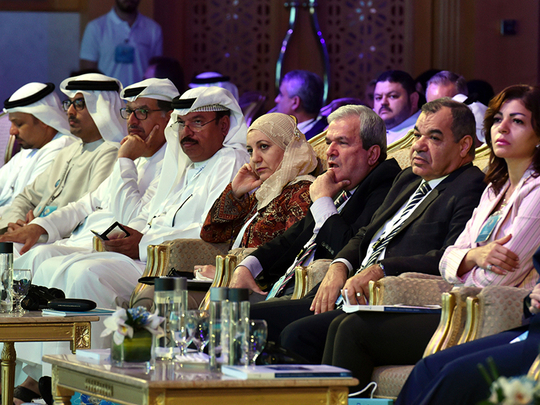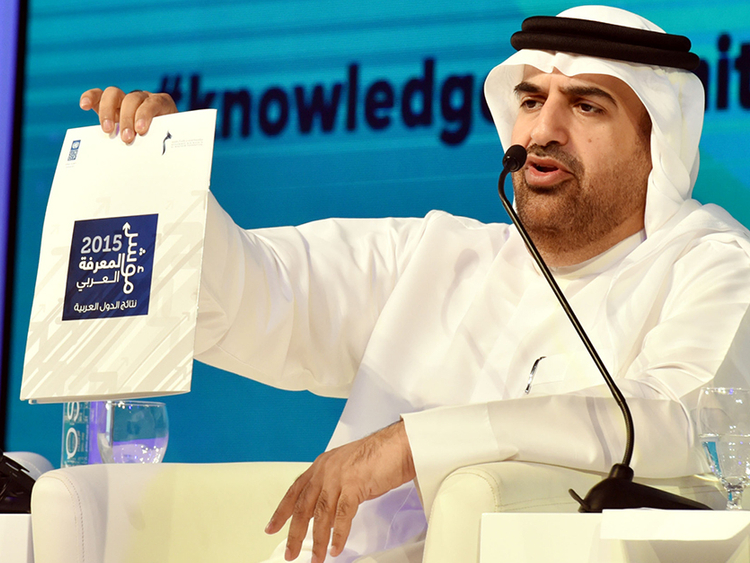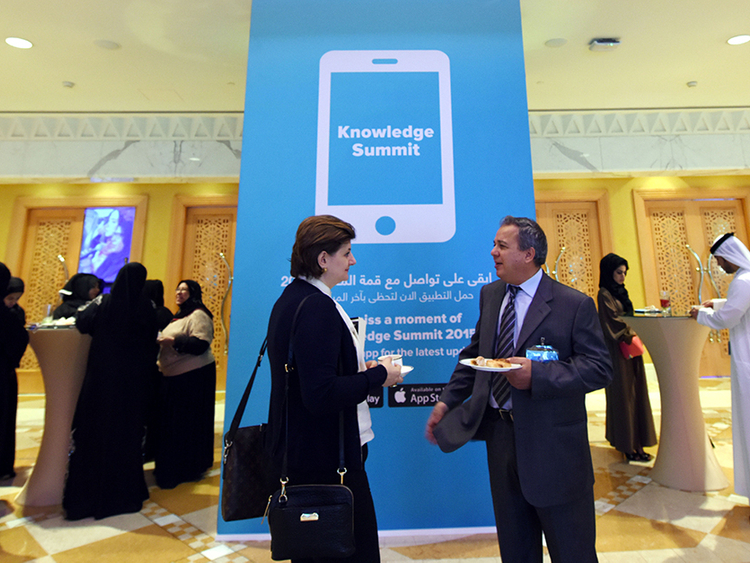
Dubai: The strengths of the UAE lie in its economy, its ease of doing business, pre-university education facilities and Information and Communication Technology (ICT), the 2015 Arab Knowledge Index revealed.
However, the index also revealed the areas for improvement in research, development and innovation.
The Arab Knowledge Index, launched at the Knowledge Summit 2015 on Monday, is a joint initiative between the Mohammad Bin Rashid Al Maktoum Foundation (MBRF) and the United Nations Development Programme (UNDP).
The report offers decision-makers, experts and researchers information on the status of knowledge in Arab countries, helping them implement development policies for building knowledge societies as well as regional and national programmes of world-class standards.
The index monitors the status of knowledge in the Arab world based on six essential components: higher education, economy, technical vocational education and training, pre-university education, information and communications technology and research innovation.
Jamal Bin Huwaireb, managing director of MBRF, said since the establishment of MBRF, it has been setting up mechanisms to measure knowledge as a continuation of its efforts, and the Arab Knowledge Index launched yesterday is a valuable product to be used.
He said the index takes into account prominent points in the knowledge aspect that are flexible to adopt and handle. “It’s not a report that displays the rankings of each country. It is a pragmatic tool that measures progress and is to be used by policymakers and researchers as a roadmap to develop strategies and adopt initiatives,” he said.
Bin Huwaireb said the index, which will be continuously updated, will allow governments to know in which domains they are strong and in which they need to improve. “They can then work on enhancing [them] to boost their civilisation.”
Bin Huwaireb added that some Arab countries see themselves in a situation wherein they can’t seem to catch up with the West, but they should instead see what other Arab countries have been able to achieve [in fields of knowledge] and work towards improving themselves.
Dr Sima Bahouth, United Nations Assistant Secretary-General and Director of the Regional Bureau for Arab States in UNDP, said the Arab region during these turbulent times is facing extremism as a result of the absence of knowledge and education.
She believes the launch of the Arab Knowledge Index and Arab Knowledge Portal: Knowledge 4 All, which is available online, provides two key tools in the pursuit of knowledge-based societies and economies.
“The Arab Knowledge Index and the associated ‘Knowledge for All’ electronic platform elaborate, in an innovative and interactive manner, the essential link between knowledge, innovation and sustainable development. This is highlighted through the three Arab Knowledge Reports we have produced with the Mohammad Bin Rashid Al Maktoum Foundation,” she said.
While the UAE topped in most of the six main indices used to measure Arab countries, the report showed that along with strengths, there are areas of improvement that need to be worked on.
Six domains in Arab Knowledge Index
The six domains in the Arab Knowledge Index and what they reveal about the UAE’s strengths and areas of improvement:
1) Pre-university index
This is a domain of critical importance to development, owing to its prominent role in establishing the foundations for building human capital. The UAE came on top in enrolment and completion with 73.64 per cent.
The level of community education was also among its strengths with 73.54 per cent. In the pre-education index, the UAE also received relatively high scores in social justice and school environment, to name a few.
Area that needs to be improved: UAE’s expenditure on pre-university education (which though among the highest compared to other Arab countries, at 40.81 per cent, can be increased.)
2) Technical vocational education and training index
UAE received a high score in ease of doing business (98 per cent), an excellent indicator of its developmental pace, and in entrepreneurship (89.52 per cent). Both domains are mutually compatible and produce high synergy for the UAE.
Labour demand and social returns also scored high (88.45 per cent).
Areas that need to be improved: Social justice and expenditure on technical vocational education and training, and education and training policies supporting entrepreneurships.
3) Higher Education Index
Higher education plays an important role in human development, contributing to the creation of new knowledge and fostering innovation and creativity in society.
The UAE received a high score for having an environment that enables higher education, with 96.26 per cent, and received 98.38 per cent in student exchange.
Areas that need to be improved: Enrolment (20.21 per cent) and graduation (13.77 per cent).
4) Information and Communications Technology Index (ICT)
One of the most important factors in building a knowledge economy and eventually fostering development, the role of ICT is critical to national progress.
The UAE received high scores in the economy sector (83.95 per cent)), education sector (77.87 per cent), and use by individuals, companies and governments (85.54 per cent).
Areas that need to be improved: Scientific research and innovation sector (58.46 per cent) and affordability of telecommunications services (51.34 per cent).
5) Economy Index
For an economy to thrive, it needs an enabling environment and the UAE scored high here — an impressive 95.40 per cent for an enabling environment of the economy. Institutional organisation of the economy also stood high (92.28 per cent).
Institutional empowerment of the economy received strong ratings (89.47 per cent).
Areas that need to be improved: Technological knowledge exchange in the economy (7.92 per cent) and economy-related information technology (51.66 per cent).
6) Research and Development and Innovation Index
This index refers to three of the most important markers of progress: Scientific research, experimental development and innovation. They are key factors to stimulating growth and helping a country build its own knowledge economy and society. They are the engines that drive economic growth and sustainable development in both advanced and developing countries alike.
In this domain, political and legal environment received the highest score (87.35 per cent). Infrastructure came second (79.24 per cent) while the socio-economic environment stood at 78.06 per cent.
Areas that need to be improved: Research and development outputs (30.57 per cent) and research development (35.29 per cent).










